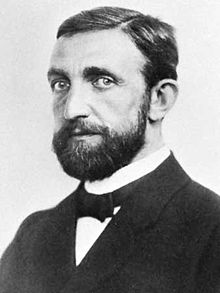
Back Philipp Lenard AN فيليب أنتون لينارد Arabic فيليب انتون لينارد ARZ Philipp Lenard AST Filipp Lenard Azerbaijani فیلیپ لنارت AZB Филипп Ленард Bashkir Філіп Эдуард Антон фон Ленард Byelorussian Филип Ленард Bulgarian ফিলিপ লেনার্ড Bengali/Bangla
Philipp Lenard | |
|---|---|
 Philipp Lenard in 1900 | |
| Born | Philipp Eduard Anton von Lenard 7 June 1862 |
| Died | 20 May 1947 (aged 84) |
| Citizenship | Hungarian[1] (1862–1907) German (1907–1947) |
| Alma mater | University of Heidelberg |
| Known for | Cathode rays Photoelectric effect Grid control Lenard window |
| Spouse | Katharina Schlehner |
| Awards | Matteucci Medal (1896) Rumford Medal (1896) Nobel Prize for Physics (1905) Franklin Medal (1932) |
| Scientific career | |
| Fields | Physics |
| Institutions | University of Budapest University of Breslau University of Aachen University of Heidelberg University of Kiel University of Berlin |
| Doctoral advisor | R. Bunsen G. H. Quincke |
| Doctoral students | Edward Andrade Walther Kossel |
Philipp Eduard Anton von Lenard (German pronunciation: [ˈfɪlɪp ˈleːnaʁt] ; Hungarian: Lénárd Fülöp Eduárd Antal; 7 June 1862 – 20 May 1947) was a Hungarian-born German physicist and the winner of the Nobel Prize for Physics in 1905 for his work on cathode rays and the discovery of many of their properties. One of his most important contributions was the experimental realization of the photoelectric effect. He discovered that the energy (speed) of the electrons ejected from a cathode depends only on the frequency, and not the intensity, of the incident light.
Lenard was a nationalist and anti-Semite; as an active proponent of the Nazi ideology, he supported Adolf Hitler in the 1920s and was an important role model for the "Deutsche Physik" movement during the Nazi period. Notably, he labeled Albert Einstein's contributions to science as Jewish physics.
- ^ "Lénárd Fülöp (1862–1947)". Sulinet (in Hungarian). Archived from the original on 2007-11-16.
© MMXXIII Rich X Search. We shall prevail. All rights reserved. Rich X Search